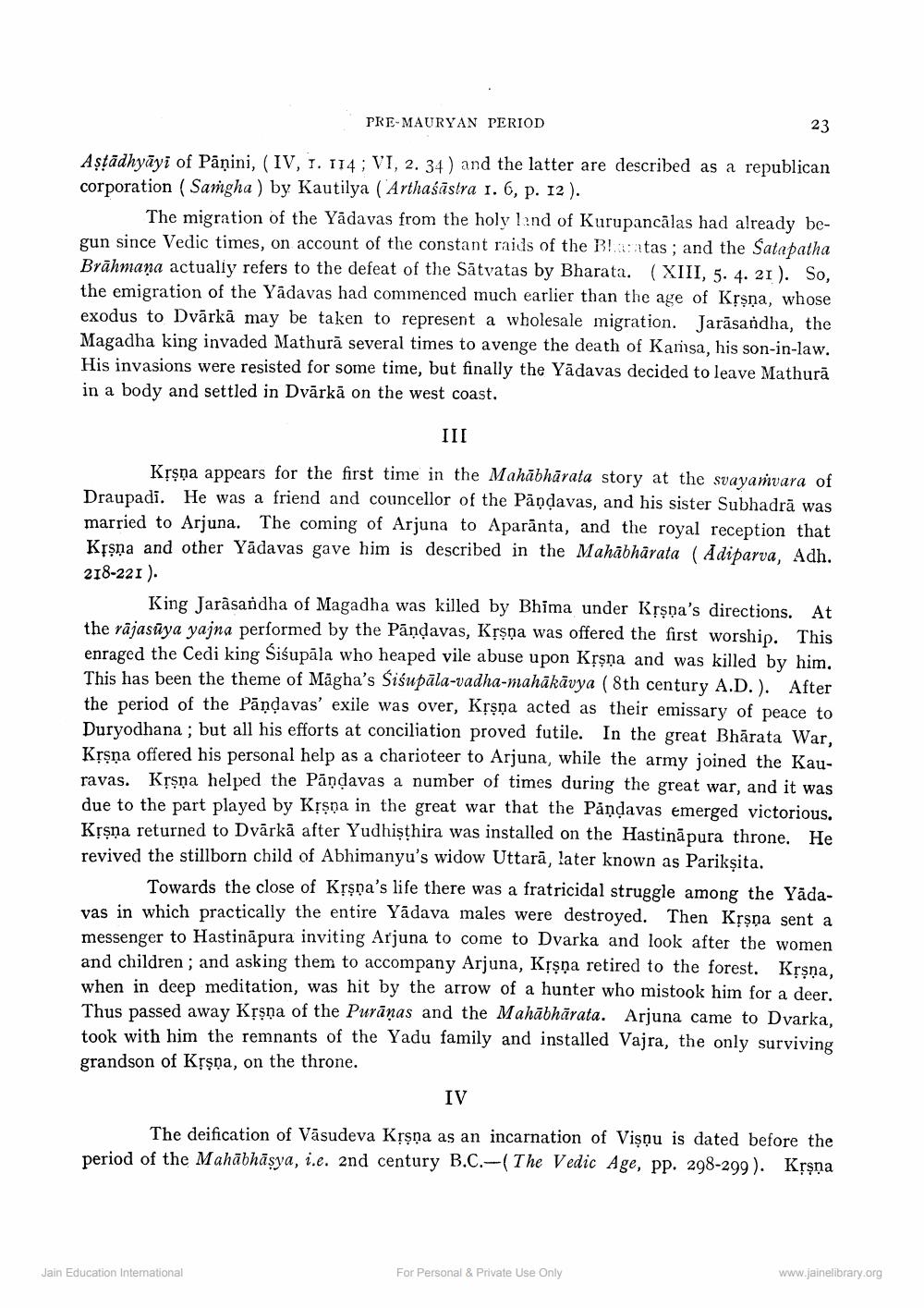________________
PRE-MAURYAN PERIOD
23
Aşťādhyāyi of Pāṇini, (IV, 1. 114; VI, 2. 34) and the latter are described as a republican corporation (Samgha ) by Kautilya (Arthaśāstra 1. 6, p. 12).
The migration of the Yādavas from the holy land of Kurupancālas had already begun since Vedic times, on account of the constant raids of the Blatas; and the Satapatha Brāhmana actually refers to the defeat of the Sātvatas by Bharata. (XIII, 5. 4. 21). So, the emigration of the Yādavas had commenced much earlier than the age of Krşņa, whose exodus to Dvārkā may be taken to represent a wholesale migration. Jarāsandha, the Magadha king invaded Mathurā several times to avenge the death of Kamsa, his son-in-law. His invasions were resisted for some time, but finally the Yādavas decided to leave Mathurā in a body and settled in Dvārkā on the west coast.
III
Krşņa appears for the first time in the Mahābhārata story at the svayamvara of Draupadi. He was a friend and councellor of the Paodavas, and his sister Subhadrā was married to Arjuna. The coming of Arjuna to Aparānta, and the royal reception that Kțşņa and other Yādavas gave him is described in the Mahābhārata (Adiparva, Adh. 218-221).
King Jarasandha of Magadha was killed by Bhima under Kșspa's directions. At the rājasūya yajna performed by the Pāņdavas, Krşņa was offered the first worship. This enraged the Cedi king Siśupāla who heaped vile abuse upon Krşna and was killed by him. This has been the theme of Māgha's siśupāla-vadha-mahākāvya ( 8th century A.D.). After the period of the Pāņdavas' exile was over, Krşņa acted as their emissary of peace to Duryodhana ; but all his efforts at conciliation proved futile. In the great Bhārata War, Krsna offered his personal help as a charioteer to Arjuna, while the army joined the Kauravas. Krsna helped the Pandavas a number of times during the great war, and it was due to the part played by Krsna in the great war that the Pandavas emerged victorious. Krsna returned to Dvārkā after Yudhisthira was installed on the Hastinapura throne. He revived the stillborn child of Abhimanyu's widow Uttarā, later known as Pariksita.
Towards the close of Krşņa's life there was a fratricidal struggle among the Yādavas in which practically the entire Yādava males were destroyed. Then Krsna sent a messenger to Hastināpura inviting Arjuna to come to Dvarka and look after the women and children; and asking them to accompany Arjuna, Kțşņa retired to the forest. Krsna, when in deep meditation, was hit by the arrow of a hunter who mistook him for a deer. Thus passed away Kșşņa of the Purāṇas and the Mahābhārata. Arjuna came to Dvarka, took with him the remnants of the Yadu family and installed Vajra, the only surviving grandson of Krşğa, on the throne.
IV
The deification of Vāsudeva Krsna as an incarnation of Vişnu is dated before the period of the Mahābhāsya, i.e. 2nd century B.C.-(The Vedic Age, pp. 298-299). Krşņa
Jain Education International
www.jainelibrary.org
For Personal & Private Use Only




